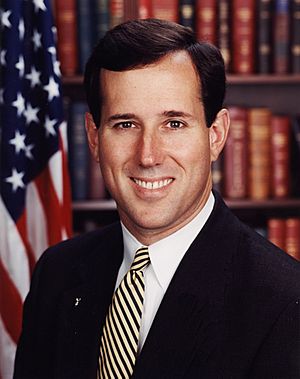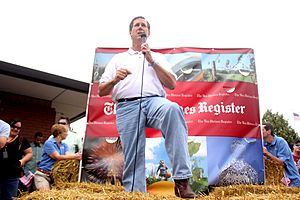Rick Santorum facts for kids
Quick facts for kids
Rick Santorum
|
|
|---|---|
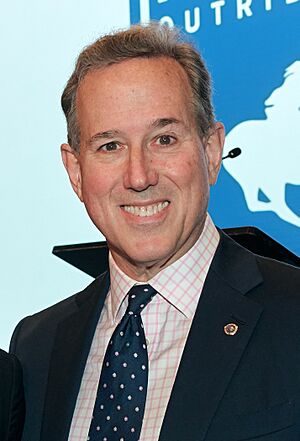
Santorum in 2025
|
|
| Chair of the Senate Republican Conference | |
| In office January 3, 2001 – January 3, 2007 |
|
| Leader | Trent Lott Bill Frist |
| Preceded by | Connie Mack III |
| Succeeded by | Jon Kyl |
| United States Senator from Pennsylvania |
|
| In office January 3, 1995 – January 3, 2007 |
|
| Preceded by | Harris Wofford |
| Succeeded by | Bob Casey Jr. |
| Member of the U.S. House of Representatives from Pennsylvania's 18th district |
|
| In office January 3, 1991 – January 3, 1995 |
|
| Preceded by | Doug Walgren |
| Succeeded by | Mike Doyle |
| Personal details | |
| Born |
Richard John Santorum
May 10, 1958 Winchester, Virginia, U.S. |
| Political party | Republican |
| Spouse |
Karen Garver
(m. 1990) |
| Children | 8 |
| Education | Pennsylvania State University (BA) University of Pittsburgh (MBA) Dickinson School of Law (JD) |
| Signature | |
Richard John Santorum Sr. (born May 10, 1958) is an American politician, lawyer, and author. He served as a U.S. Senator for the state of Pennsylvania from 1995 to 2007. During his time in the Senate, he was a leading member of the Republican Party.
Santorum is known for his conservative views. He ran for president in 2012 and 2016. After leaving the Senate, he worked as a political commentator for news channels like Fox News Channel and CNN.
Early Life and Education
Richard John Santorum was born in Winchester, Virginia. His father was a clinical psychologist who had moved to the U.S. from Italy, and his mother was a nurse. Santorum grew up mostly in Butler County, Pennsylvania.
He attended Pennsylvania State University and earned a degree in political science in 1980. He later earned advanced degrees in business and law.
Political Career
Before being elected to office, Santorum worked as an assistant to a state senator in Pennsylvania. He also worked as a lawyer for a law firm in Pittsburgh for four years.
U.S. House of Representatives (1991–1995)
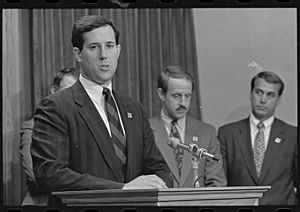
In 1990, at age 32, Santorum was elected to the United States House of Representatives. He represented a district in the suburbs of Pittsburgh. He was reelected in 1992. During his time in the House, he became known for wanting to expose problems in Congress.
U.S. Senate (1995–2007)
Santorum was elected to the United States Senate in 1994 and was reelected in 2000. He served two terms, representing Pennsylvania. In 2006, he ran for a third term but lost the election to the Democratic candidate, Bob Casey, Jr..
Party Leadership
In 2000, Santorum became the chairman of the Senate Republican Conference. This made him the third-highest-ranking Republican in the Senate. He was a key spokesperson for his party and helped direct its communications.
Key Issues and Laws
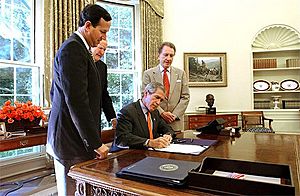
While in the Senate, Santorum was involved in many important issues. He helped write the 1996 law that changed the nation's welfare system. He also supported religious freedom and founded a group in Congress to focus on it.
Santorum added a part to a 2001 education bill that would have encouraged schools to teach different ideas about the origins of life, including intelligent design, along with the theory of evolution. This part was later removed from the final law.
Foreign Policy
Santorum supported the War on Terror and the U.S. involvement in Iraq and Afghanistan. He believed in taking a strong stance against countries that support terrorism. He sponsored laws that put pressure on countries like Syria and Iran.
Presidential Campaigns
Santorum ran for the Republican nomination for president two times.
2012 Presidential Campaign
Santorum decided to run for president in the 2012 Republican primaries. At first, he was not a leading candidate, but he gained support as the campaign went on.
He surprisingly won the Iowa caucuses, the first contest of the primary season. He went on to win 11 state primaries and caucuses. He ended his campaign in April 2012, finishing second to Mitt Romney, who became the Republican nominee.
2016 Presidential Campaign
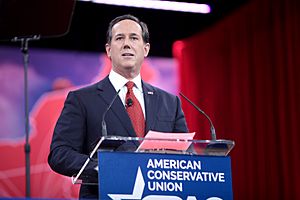
Santorum ran for president again in 2016. He ended his campaign early in the race after not getting much support in the Iowa caucuses. He later endorsed Marco Rubio and then Donald Trump.
Life After Politics
After leaving the Senate in 2007, Santorum worked for a conservative research group and became a political commentator on the Fox News Channel. He also worked as a lawyer and business consultant.
In 2017, he joined CNN as a commentator. He left CNN in 2021 after making comments about Native American culture that were considered dismissive by many people. He is also the author of several books.
Political Views
Santorum is known for his strong conservative views, especially on social issues. He often talks about the importance of family and faith. He believes that marriage should be between a man and a woman. While in Congress, he supported programs to fight poverty and disease around the world.
He does not agree with the scientific view that climate change is mainly caused by humans. He supports using America's own resources like oil, coal, and natural gas for energy. He is also a strong supporter of the right for people to own guns.
In recent years, Santorum has supported policies to help working families, such as an increase in the minimum wage and paid time off for new parents.
Personal Life
Santorum married Karen Garver in 1990. She was a nurse when they met. They have seven living children. The Santorums are devout Catholics, and faith is a very important part of their lives.
In 1996, their son Gabriel was born very prematurely and died a few hours later. The family has spoken about how this loss affected them deeply.
Their youngest daughter, Isabella (called Bella), was born with a serious genetic condition called Trisomy 18. Despite doctors' predictions, she has lived much longer than expected. Santorum often speaks about how Bella has inspired his family.
Images for kids
See also
 In Spanish: Rick Santorum para niños
In Spanish: Rick Santorum para niños
 | Misty Copeland |
 | Raven Wilkinson |
 | Debra Austin |
 | Aesha Ash |


